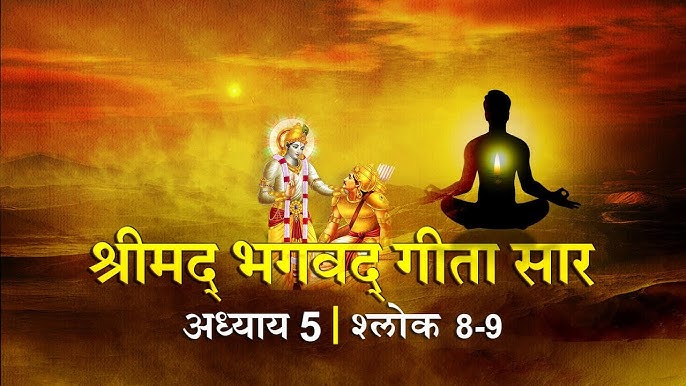In Srimad Bhagwat Gita, Chapter 5, Shlok 8 and 9, God has clearly mentioned that all the 13 kriyas is done by him and not by humans.
नैव किञ्चित्करोमीति युक्तो मन्येत तत्त्ववित् |
पश्यञ्शृण्वन्स्पृशञ्जिघ्रन्नश्नन्गच्छन्स्वपञ्श्वसन् || 8||
प्रलपन्विसृजन्गृह्ण्न्नुन्मिषन्निमिषन्नपि |
इन्द्रियाणीन्द्रियार्थेषु वर्तन्त इति धारयन् || 9||
Those 13 kriyas are:
पश्यन् / Pashyan: Refers to the action of seeing. Have you ever thought how surprising it is that we can effortlessly perceive a wide array of colors, shapes, and even emotions through our vision? It’s a gift that allows us to experience the richness of the world around us purely through sight.
Like Netra and Chakshu – Have you ever wonderered that despite the Eye size remaining the same, Ocean fits in such a small eye.
शृण्वन् / Shrinvan: Refers to the act of hearing. Have you ever paused to consider how remarkable it is that we can effortlessly recognize and differentiate various sounds? Whether it’s human voices, bird songs, or animal calls, our ability to perceive and interpret these auditory signals happens seamlessly and without conscious effort.
स्पृशन् / Sprushan: Refers to the act of touching or feeling. Have you ever thought who enables us to distinguish between sensations like hot and cold? How is it that we instinctively react, such as crying when hurt, without consciously deciding to do so?
जिघ्रन् / Jighran: Refers to the act of smelling. Have you ever considered the significance of our sense of smell? How is it that we can easily distinguish between different scents, such as the fragrance of a rose versus that of jasmine? It’s a remarkable ability that enriches our sensory experience.
अश्नन् / Ashnan: Refers to the act of eating. Have you ever considered how incredible it is that whatever we eat transforms into our blood? Across different cultures and continents—Asians, Americans, Africans—this process remains the same. It’s truly worth pondering how our bodies seamlessly convert food into the essential elements that sustain our life.
And have you ever wondered about the different tastes—sweet, sour, spicy, bland, salty—and how easily we can tell them apart? Our senses let us enjoy all these flavors without us even trying.
गच्छन् / Gachhan: Refers to Moving. It’s so fascinating that how our bodies effortlessly maintain balance without conscious effort once we learn it as infants. We don’t have to consciously remind ourselves to do it every time we stand up? It becomes automatic and effortless.
स्वपन् / (Swapan) : Refers to Sleeping and how we rest. Sleep is something that comes naturally to us without requiring effort. We often don’t even realize the exact moment we fall asleep. Imagine if we couldn’t sleep — it’s been shown that just one day without sleep can lead to increased irritability, anxiety, and difficulties with clear thinking. Sleep is a designed by God to allow us to relax and rejuvenate our minds and bodies
Sleep is the Anubhav of Brahma – We forget ourselves for that duration of time.
श्वसन् / Shvasan: Refers to breathing, something all living beings depend on. Have you ever noticed how you don’t need to think about breathing—it happens naturally, without any effort? It’s essential for our life, yet it’s something we do automatically, without having to remind ourselves every day.
प्रलपन् / Pralapan: Refers to speaking or talking. Have you ever noticed that once you’ve learned how to speak and pronounce words like ‘A’ or ‘B’, it becomes automatic? You don’t have to constantly remind yourself how to make these sounds—it comes naturally once you’ve learned it.
विसृजन्/ Visrujan refers to giving up or excreting
Have you ever considered how our digestive system works? It’s fascinating how our body breaks down food into nutrients and separates liquids and solids, which eventually become urine and feces. This process is so well-designed by God. Interestingly, we have no control over when this digestion happens—it all occurs automatically in our bodies.
गृह्णन् / gruhnan means holding.
Have you ever considered that we don’t need to teach babies how to hold things? It happens automatically. Similarly, as adults, we don’t need constant reminders on how to hold objects like bags—it comes naturally and effortlessly to us.
उन्मिषन् / Unmishan refers to opening the eyes and
निमिषन् / nimishan refers to closing the eyes
Have you ever thought about the act of blinking? It’s one of the smallest actions we do, yet it’s crucial for our eye health. On average, people blink about 15-20 times per minute. Blinking helps keep our eyes moist, clean, and nourished. If we didn’t blink, our corneas could swell, and our eyes might suffer from infections, dryness, and blurry vision.Interestingly, blinking is completely automatic and effortless for us. We don’t consciously control when we blink—it happens naturally to protect and maintain the health of our eyes.
To summarize, with these 13 activities that our body performs daily to sustain our life, it’s evident we have no control over them. We see, hear, touch, smell, eat, move, sleep, breathe, speak, release, hold, open, and close our eyes—all of these happen automatically without our conscious effort. This realization leads to the understanding that in reality, we have infact no control over these fundamental bodily functions. It highlights the idea that God or the divine force is the ultimate doer, orchestrating these activities within us. This understanding can lead to a deeper spiritual insight and a sense of surrender to the divine will.
We constantly have to show to our buddhi/ intellect that even in performing these basic actions / kriyas, we have no control. Then in reality what control does a human have ? the answer is NOTHING! When we realize this, we will understand ourselves naturally.

Leave a Reply